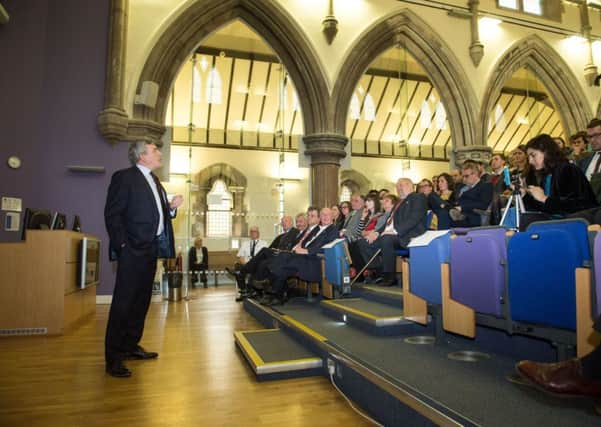Gordon Brown: Tories have become ‘anti-Scottish’


In a speech last night, Mr Brown attacked Mr Cameron for attempting to ”whip up English nationalism” with the Conservatives’ controversial plan to introduce English Votes for English Laws (Evel) that would restrict the role of Scottish MPs.
In a scathing attack on the man who ousted him as Prime Minister in 2010, Mr Brown warned that Mr Cameron’s plan was “hammering a further nail in the coffin of the Union” that would lead to a rise in nationalist sentiment both north and south of the Border.
Advertisement
Hide AdAdvertisement
Hide AdMr Brown said the Conservatives had sought to present themselves as the only alternative to an “imaginary SNP-led Labour government controlled from Scotland” in a bid to appeal to voters in England.


Mr Brown, widely credited with playing a key role in the No campaign’s referendum victory last year, said his successor was using “Scottish nationalism to incite English nationalism” as a desperate tactic to win next week’s election.
He said Mr Cameron’s stance was a departure from his party’s approach during last year’s independence vote, when the Conservatives worked alongside Labour in the Better Together campaign. He claimed the Prime Minister was now trying to stroke “English fears of unacceptable Scottish manipulation” at Westminster to gain narrow party advantage after the Tories failed to discredit Ed Miliband in the UK election campaign.
Mr Brown said the Conservative Party had “sacrificed its historic commitment to being a Unionist party to become an English Nationalist Party”, with Mr Cameron’s plan to give MPs for English seats a veto on issues which only affect England.
He suggested such a plan would lead to further resentment in Scotland about a remote Westminster parliament and boost support for the SNP’s goal of Scottish independence. “The sadness of this campaign is, by making unrealistic demands on England the SNP’s demands only encourage anti-Scottish sentiment to grow in England,” Mr Brown said in the speech at Glasgow University, where he received an honorary doctorate yesterday.
The former Labour leader said Mr Cameron’s Evel plan and the polls surge of the SNP represented an “election of two nationalisms” that would be the first ever UK-wide electoral contest in which the future of the Union was at stake. Mr Brown suggested the Prime Minister’s package of reforms, which include plans for an English rate of income tax, could lead to the powers of Holyrood being curtailed.
He said: “It will stir up even more anti-Scottish resentment. And when that happens? What does Mr Cameron do? If he follows through he has to inevitably try to curtail the powers of the Scottish Parliament – and would be hammering a further nail in the coffin of the Union by doing so.
“We need to understand what has happened to make this the first election in modern times at which not just the future of the UK but the very existence of the UK is at issue – where the question is not what kind of country we are, but whether we are a country at all.
Advertisement
Hide AdAdvertisement
Hide Ad“Instead of spending his time defending the Union, Mr Cameron has been using Scottish nationalism to incite English nationalism, emphasising how the SNP play the Scottish card to justify them playing the English card.”
Mr Brown also accused Mr Cameron of being unstatesmanlike and of promoting “gesture” politics, with the Conservative campaign in England focusing on suggestions that a Labour government would be controlled by the SNP.
Mr Brown said: “Having been unsuccessful in making the election a contest, counter-posing a Conservative government against a potential Labour government, they have now tried to make the election a referendum that counterposes a Conservative government against an imaginary SNP-led Labour Government controlled from Scotland.
“The most insidious of all Conservative attempts to whip up English nationalism is their main election stunt: a poster campaign in England designed to foment anti-SNP and anti-Scottish feeling in England as part of a claim Labour would be controlled by them from Scotland.”
The former prime minister, who is retiring as an MP after 32 years, said that such as approach would only serve to fuel nationalism in Scotland and England and place the Union at risk.
He said: “This tit-for-tat policy to divide and rule sweeps aside what binds us together in favour of emphasising what drives us apart. And they are doing this despite the fact that the United Kingdom loses as a result: the government of the day has stopped speaking up for the Union they claim to support — and indeed, the Conservative and Unionist Party has sacrificed its historic commitment to being a Unionist party to become an English Nationalist Party.
“And when the country is crying out for statesmanship and when all we have been offered are tit-for-tat gestures that pose one form of nationalism – English nationalism – against another – Scottish nationalism.” He added that Mr Cameron’s “anti-Scottish campaign” could mean the party may never recover electorally in Scotland.
He said: “With few seats to gain or lose in Scotland or Wales, the Tories think they have a magic formula: they can head off Ukip in England, avoid a referendum on their record and win support by making the central issue English fears of unacceptable Scottish manipulation of Britain, even when there is no possibility of a Labour-SNP pact, coalition, deal, tie-in or other arrangement. The question is now not where stands Britain but whether Britain will stand at all.”
Advertisement
Hide AdAdvertisement
Hide AdHowever, Conservative MSP Alex Johnstone said: “It’s a sign of the desperation of the Labour Party in Scotland that it is turning on its Better Together allies to score points.
“It’s not possible to talk about devolution in Scotland without devolution in England.”